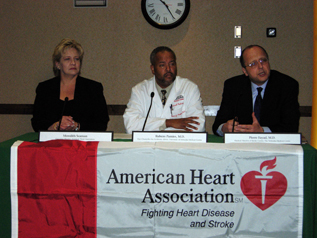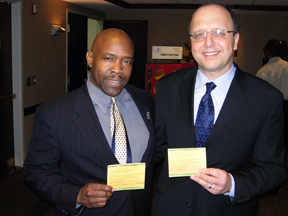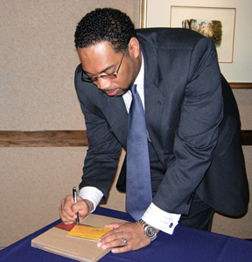It happened to Coretta Scott King, Luther Vandross and most recently to baseball player Kirby Puckett. And it may happen to you – a stroke. Blacks are almost twice as likely to have a stroke as whites, and about 100,000 African Americans will suffer from one this year, according to the American Stroke Association, a division of the American Heart Association.
 |
Speakers at the news conference included, from left: Meredith Seaman, executive director of the American Heart Association’s Omaha office; Rubens Pamies, M.D., vice chancellor for academic affairs and dean of graduate studies at UNMC who co-authored a book on health disparities; and Pierre Fayad, M.D., the Reynolds Centennial Professor and chairman of UNMC’s Department of Neurological Sciences. |
Stroke is the third leading cause of death for all Americans, but African Americans are at increased risk because of higher blood pressure and higher incidence of diabetes. “Socio-economic conditions and access to health care are two other elements faced by many African Americans,” Dr. Pamies said. “Despite these facts, less than half of African Americans recognize that they are the racial/ethnic group at most risk for stroke.”
A stroke results from a sudden interruption of blood supply to the brain or when a blood vessel in the brain ruptures, leaking blood into the spaces surrounding the brain cells. Brain cells die when they no longer receive oxygen and nutrients from the blood or when they are damaged by sudden bleeding into or around the brain. Timely treatment can save these cells and prevent brain damage.
“The sooner a patient gets treatment for a stroke, the better the outcome. That’s why an educational campaign like this one is so important,” Dr. Pamies said.
 |
Wayne Houston, left, North Omaha community liaison for UNMC, and Dr. Pierre Fayad, the Reynolds Centennial Professor and chairman of UNMC’s Department of Neurological Sciences, show the Power to End Stroke pledge cards they signed at Monday’s news conference. |
Within minutes after his stroke, White was receiving care at the Stroke Center at The Nebraska Medical Center. “I’m back to living life again. I can now do everything I could do before the stroke,” White said. “I know it’s because of the prompt care I received at The Nebraska Medical Center. I know it could have been much worse.”
White was given a clot-buster medication called tPA. It needs to be administered within three hours from the onset of symptoms to be effective. “The Stroke Center at The Nebraska Medical Center is among the best in the nation for being able to organize the delivery of efficient and effective treatment as soon as possible after the onset of stroke symptoms,” said Pierre Fayad, M.D., medical director of the stroke center at The Nebraska Medical Center and Reynolds Centennial Professor and Chairman of Neurological Sciences at UNMC. “Nationally, less than 3 percent of stroke patients are treated with appropriate medications within this three hour window.”
The stroke team at The Nebraska Medical Center is poised to help patients seven days a week, 24 hours a day. The Stroke Center at The Nebraska Medical Center is the only nationally certified stroke center in the state of Nebraska and the only one of its kind in the surrounding region dedicated to the prevention and management of stroke.
Symptoms of a stroke may be sudden and include:
- Weakness or numbness on one side of the body, face or both
- Loss of vision on one or both sides
- Difficulty speaking or understanding speech
- Loss of balance
- Severe headaches with no other known cause
“Stroke is now a treatable condition, but the best treatment is prevention,” Dr. Fayad said. “Keep your blood pressure and cholesterol in check, lower your risk, know your family history and make sure you get help fast if you have a stroke.”
 |
Pastor Leroy Adams of Morning Star Baptist Church in Omaha signs a Power to End Stroke pledge card. Adams was one of six African American community leaders who signed pledge cards on Monday. |
Power to End Stroke proponents are encouraging African American Omahans to take the American Stroke Association’s pledge. The pledge may be shared with relatives and friends, and includes a reply card for people to request and receive stroke-related information and incentives throughout the year.
“The goal of the pledge is not just to create survivors, but ‘thrivers,’ by helping African Americans to do their part to make positive health choices for themselves and their families to prevent stroke,” Dr. Pamies said. “That means being proactive in assessing your risk, discussing it with your doctor and making lifestyle changes to prevent stroke.”
Pledges can be made at www.powertoendstroke.org.